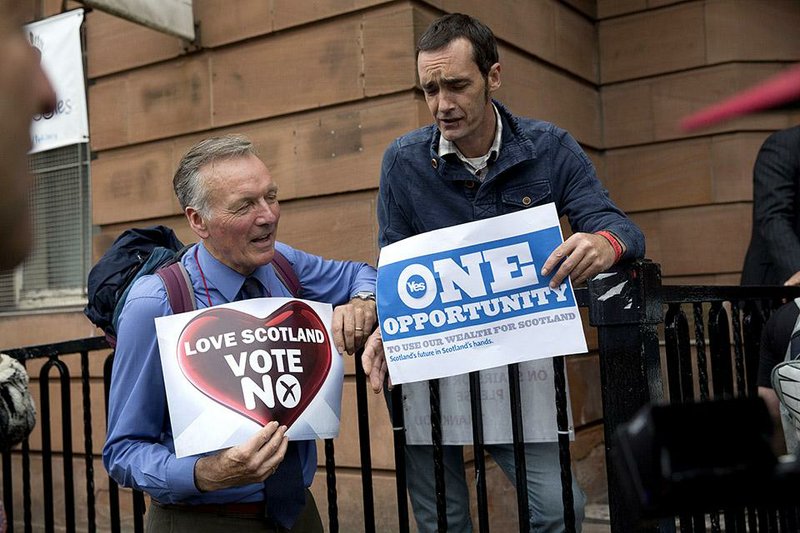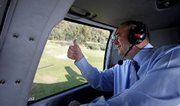GLASGOW, Scotland -- On the final day of campaigning over Scotland's future, independence supporters and opponents made emotional appeals to wavering voters to take their side.
Several hundred people massed Wednesday on the steps of the Royal Concert Hall on Buchanan Street in Glasgow waving flags and banners in support of withdrawing from the United Kingdom.
"Yes we can! And we will!" they chanted. "Hope, not fear!"
Across town in a hall in the Maryhill district, there were more bagpipes and kilts, this time for those opposing independence from Britain.
Former British Prime Minister Gordon Brown's voice cracked as he exhorted voters to stay in the U.K. and emphasized the finality of today's vote on a simple but sweeping question: "Should Scotland be an independent country?"
"Once it's done, it's done," he said, in evoking Shakespeare's Scottish play, Macbeth.
"If you have any doubts, and if you don't know, the answer has to be no," Brown said, to cheers. To "people who were thinking of voting 'yes' yesterday but are wavering today," he warned that independence would be "an economic trapdoor down which we go, from which we might never escape."
In the audience, 64-year-old Lynda Angerson's mind was made up.
"We're British, that's our nationality," the retired teacher said. "I just hate the thought our country's being broken up."
Earlier, in the center of the city, the independence supporters were confident of victory. Blair Jenkins, leader of the Yes Scotland campaign, told the people at the rally that they were part of "the largest grass-roots movement Scotland's ever seen."
Sharon Jessop, 49, an academic, was born in Canada and moved to Scotland at age 8. She said she'd be voting for independence.
"It's an amazing opportunity for a democratic and fair society," she said. "At the moment, we're overwhelmed by the vote from south of the border. Forty percent of children in this city live in poverty, and I'm deeply ashamed of that. We don't have the power to make the kind of difference we can make."
Scotland's First Minister Alex Salmond, who heads the semiautonomous government in Edinburgh that pressed for the referendum, was to address supporters in Perth on Wednesday evening.
"Don't let this opportunity slip through our fingers," he said earlier in a letter to voters. "It's the greatest, most empowering moment any of us will ever have."
The public support for independence has many roots: a seemingly unending stream of foreign wars, a financial crisis that accelerated an already widening gap between rich and poor, and an insular and privileged British political class that, some say, seems to only look after its own.
"Ten years ago, I couldn't have imagined Scottish independence. But you have this extremely complacent leadership just taking people for granted across the country," said Jamie Drever, 37, who has never been involved in a campaign before but was out knocking on doors to spread the gospel of independence in Glasgow this week.
"They've inherited these grand old buildings and are harking back to a Britain that no longer exists," Drever said. "But the reality tells us that the British economy is in the toilet."
Salmond, the tart-tongued Scottish independence leader whose working-class origins set him apart from the privileged clique that dominates politics in London, has skillfully deflected some questions about Scotland's viability by reminding voters of their antipathy for the London elite.
In the campaign's closing days, Salmond has cast the voters' choice as one between "Team Scotland" and "Team Westminster" -- the latter a reference to the palace in which London politicians ply their trade.
The three major British party leaders went to Scotland last week after polls showed the referendum had slipped into a dead heat after months of comfortable leads for the anti-independence camp. Salmond mocked the politicians and accused them of caring more about their reputations than they do about Scotland.
"What Team Westminster seem to be concerned about is their own jobs," he said.
Those jobs may very well be on the line. Prime Minister David Cameron could face a revolt in his Conservative Party, and calls for resignation, if Scotland splits the union.
His chief rival, Labor Party leader Ed Miliband, is likely to face problems as well. Scotland has long been a reliable supporter of his left-leaning party in national elections.
Miliband on Tuesday tried to campaign against independence at an Edinburgh shopping mall, only to have his visit cut short by a group of demonstrators who heckled him with calls of "liar" and "serial murderer" -- an apparent reference to the Labor Party's support for the wars in Iraq and Afghanistan.
The anti-London sentiment is not limited to Scotland, with polls showing disillusionment with politics across the United Kingdom.
British officials said they have made no contingency plans for a vote favoring independence because they don't expect it. But they have warned that a breakup could be turbulent -- especially for Scotland.
"It's the uncertainty that is the killer of independence," said Alistair Carmichael, the British government's secretary of state for Scotland. "Ultimately, people will cast a vote for what will be best for them and their families. But with that enormous amount of uncertainty, you can't be sure what you're buying into."
Scottish officials, led by Salmond, have dismissed such comments as scaremongering. They insist that an independent Scotland would be more egalitarian and socially just once it is free of the austerity policies imposed by London.
Despite the political and economic uncertainty, the pound was little changed in London trading Wednesday, up 0.3 percent at $1.6320 as of 5:26 p.m. in London. It slumped to a nine-month low last week after polls showed the independence campaign ahead for the first time.
A phone poll of 1,373 people by Ipsos MORI, conducted Monday and Tuesday and released Wednesday, put opposition to independence at 51 percent and support at 49 percent, with 5 percent of voters undecided. The margin of error was plus or minus 3 percentage points.
Most experts said it was too close to call Wednesday, but some other polls this week have shown the opposition with a slight lead after Scotland's leading banks warned they would move their headquarters to England if Scots vote to leave the U.K. The warnings renewed concerns about an independent Scotland's ability to retain businesses.
Questions also remain over the currency to be used by an independent Scotland. The Scottish government has said it will continue to use the pound sterling, but the British government said it won't agree to a currency union.
More than 4.2 million people are registered to vote in the country of 5.3 million people, a full 97 percent of those eligible -- including, for the first time, 16- and 17-year-olds. Polls will open at 7 a.m. Scotland time today and will close at 10 p.m. Results will start coming in tonight, with a definitive answer expected by Friday morning.
Elsewhere Wednesday, the Spanish government, struggling with its own secessionist movement in Catalonia, stepped up its resistance to the Scottish referendum, with Prime Minister Mariano Rajoy saying independence votes were damaging for the European Union.
Foreign Minister Jose Manuel Garcia-Margallo went further during a parliamentary debate in Madrid.
"Secession would be a catastrophe for Scotland," Garcia-Margallo said. "It would start a process of Balkanization that nobody in Europe wants."
On the working-class streets of Glasgow this week, many voters said they trust Salmond's assurances that an independent Scotland would be better off. But others said they have concerns about whether taxes, health care and energy costs would change under an independent Scotland.
Marco Guarino, a 54-year-old lawyer canvassing in support of independence, answered them with a question: "If you're undecided, ask yourself whether Westminster wants to keep us because they're valuable to us or because we're valuable to them."
Many converts later, Guarino called it a night, smiling with the satisfaction that Scotland had moved just a little closer to independence.
"Everybody," he said, "hates Westminster."
Information for this article was contributed by Robert Hutton, Svenja O'Donnell, Lukanyo Mnyanda, Rodney Jefferson, Jennifer Ryan and Angeline Benoit of Bloomberg News; by Jill Lawless, Pan Pylas and staff members of The Associated Press; and by Griff Witte, Ishaan Tharoor and Adam Taylor of The Washington Post.
A Section on 09/18/2014


